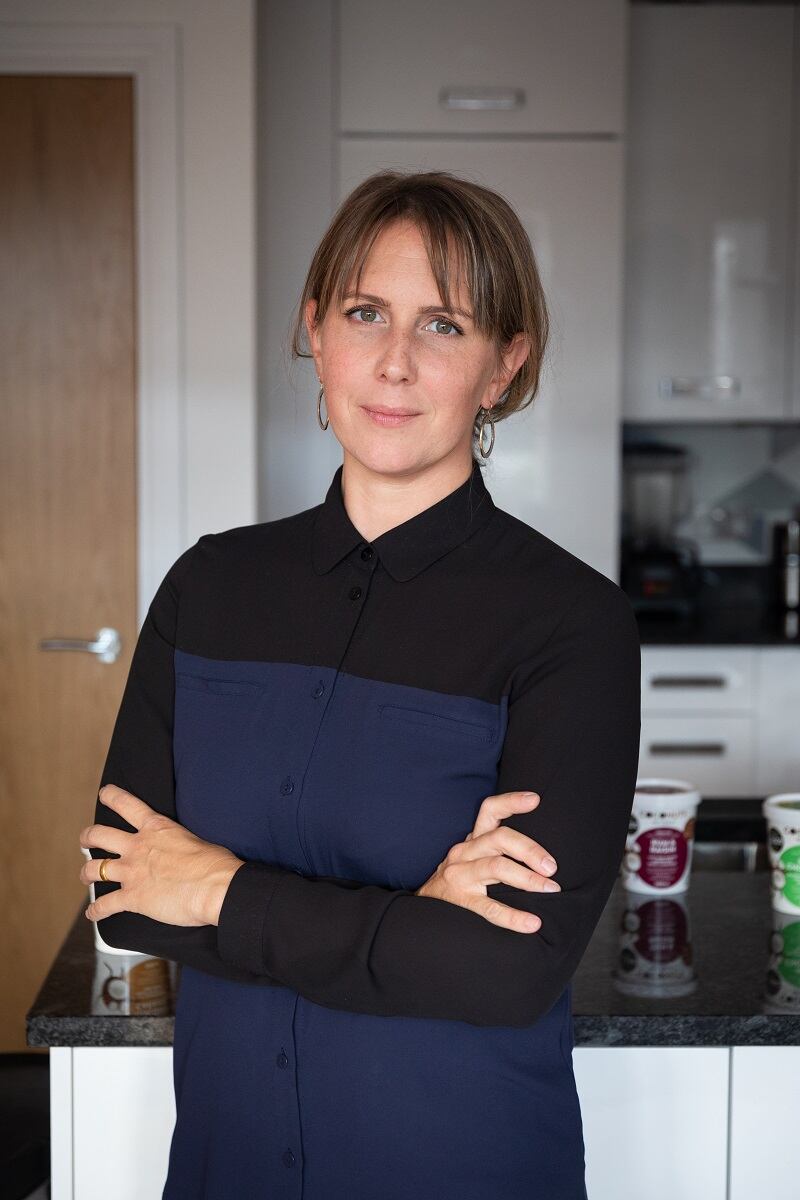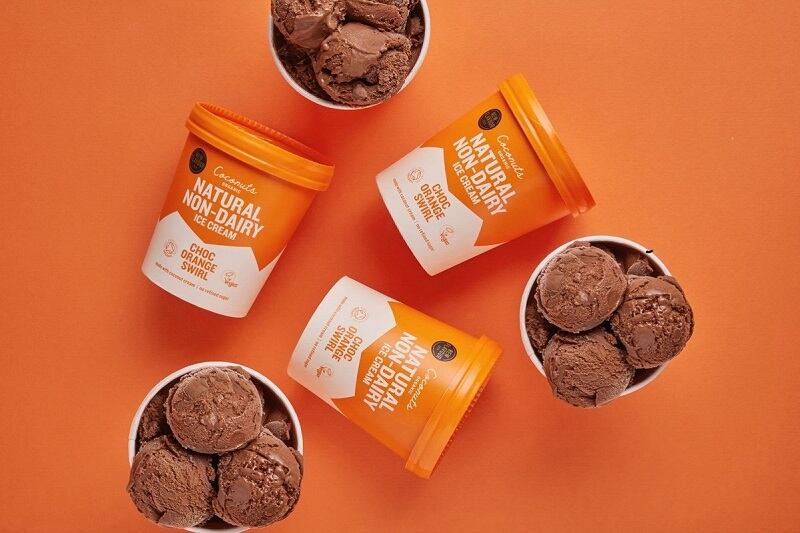Healthy ice cream? Surely an oxymoron. But Cecily Mills was determined to make her own ice cream made with natural ingredients and a taste and texture to rival the best dairy ice cream. Her endeavour was inspired after she turned vegan to increase her energy levels. Ice cream was the one thing she really missed. “The dairy-free options just weren't cutting it for me,” she said, “either they were full of artificial sweeteners or the texture was too icy.”
After much experimenting and some disasters with a pasteurising machine, she went on to launch Coconuts Organic non-diary ice cream (under its previous name Coconuts Naturally) in 2015.
She also went on to become one of the few people to turn down a lucrative offer on the BBC show Dragons’ Den. The reason for the rare rebuttal was a deal with the UK’s largest supermarket Tesco, where her non-dairy ice cream is now on sale in more than 600 stores.
What's healthier: low calorie or natural ingredients?
“The question we get asked quite a lot is: is it healthier?” Mills told FoodNavigator.
Coconuts Organic is made with coconut cream and sweetened with unrefined coconut sugar to produce a smooth, thick and creamy texture. The stabilizer blends used are organic locust bean gum and guar gum – imported from places such as Ecuador and Indonesia - and pectin.
“Pectin is the fibre you get from apples that your granny would have used when she made jam,” said Mills. “So they are ingredients which are as minimally processed as possible.” That’s different from diary-based ice cream, which Mills complained use synthetic emulsifier blends like, for example, the monoglyceride blend.
“By any other name these can often contain trans fats and if people knew that these blends contained trans fats and they were labelled as such you wouldn't touch them with a barge poll,” she said. “But these synthetic blends make ice cream very stable and scoopable and well textured, that's why people use them.”
She makes the case that “natural and proper ingredients” such as hers are preferable to the low-sugar or low-calorie options on the ice cream market, whose unique selling point, according to Mills, is that you can eat a whole tub 'guilt-free'. “But a lot of the sugar replacements that people are using such as stevia and erythritol are kinds of sugars that are all created in a lab. They are all extracted, very highly processed ingredients. I would question if you want to eat a whole tub of that or do you actually want to eat a product where your body will recognise the ingredients as an actual food product.”
With Coconuts Organic, said Mills: “You'll be able to have a portion and feel satiated because it's proper food and it’s proper ingredients that your body recognises.”
Her tick for healthier, she declared, is natural, organic ingredients, over low-sugar or low-calorie options. “That's where we see a real opportunity. I think there's a lot of people out there who agree with that and we're seeing that with the uptake we've had in Tesco.”
Customers will need to pay for it, though. At a price point of £5, Coconuts Organic is firmly in premium mass market sector. That said, there’s no evidence customers are not prepared to pay a slight premium for 'healthier' ice cream.
The Cornwall-based business has achieved more than 100% sales growth every year in its first three years and has established itself as a dominant player in the free-from category. In addition to the Tesco listing, Coconuts Organic is currently available UK-wide, via Ocado and in independent stores and cafes via two national distributors.
What’s the plan now? The company wants to expand its supermarket listings, its supermarket portfolio and store distribution portfolio. The brand is also developing its international expansion plans. The product is available in Dubai and Cyprus and it plans to launch in Singapore.
“We’ve got a lot other exciting markets that we are exploring internationally. The dairy-free and vegan thing is just exploding across the globe so there's a lot of potential there."
Mills also sees a gap in the market in the food service sector. “We think there's a real opportunity for healthier treats on the go. Currently you go to a petrol station and all the ice cream you can buy is all stuffed full of refined sugar, flavourings and colouring."
The firm is developing new formats and flavours. Currently there are seven flavours in the range including two exclusive flavours with Tesco: Choc Orange and Double Caramel. The brand hopes to bring out a couple of new flavours by Easter next year.

‘What we are doing is very unusual in the industry’
But being a vegan ice cream maker brings its challenges. The current range took “four years of constant effort”, explained Mills.
Unlike traditional ice cream makers who have a base mix to which they will add flavourings to, Cocoanuts Organic don't have a standard recipe. The company uses completely different recipes for all of its flavours. “If you're putting cocoa powder into your ice cream, that's got a higher solid content than if you're putting a little bit of spirulina and bit of peppermint oil,” explained Mills. “So all of our recipes are different and that's been a real challenge because no manufacturer is used to that. What we are doing is very unusual in the industry.”
This uniqueness is explained by her unconventional route into the industry.
Mills is a former M&S store manager who started the business four years ago “literally from my kitchen table in Cornwall. I started it after making changes to my own diet looking for more energy to cope with a demanding job I had in the South East.”
“I’ve gone into this with no food tech background and no manufacturing background. I developed the flavours completely independently of each other, which is why we've got all these different recipes. I’ve been blessed enough to find a manufacturer who understands that and who is able to cope with my formulas and recipes so we can make them all different. That's been one of the hardest challenges.”
Ice cream trends to watch
The next challenge is developing new flavours and formats in line with new trends. "I think we're going to start seeing more and more superfoods coming into ice cream,” stated Mills. “You have it a little bit already but it's something we are very much exploring and backing.”
Mills would like to see what she described as a “democratising of the health food movement… If we can get a £5 price point, £3 when it's on offer, in the super market with added superfoods in, it becomes available to everyone suddenly."
Another area is alcohol. "We are seeing that people want the interesting flavours, and for a brand like us that point of difference is really important because we're not here to compete with vanilla ice cream. So things like alcohol in flavours, if you can get the balance right, it's a really nice point of difference and gaining new customers."
'We want to be the most sustainable, recyclable ice cream company out there'
In line with shifting consumer expectations of brands, Coconuts Organics is also looking into alternative options for the ingredients of its packaging.
"We want to be certified B Corp in four or five years’ time, and packaging is one of our biggest issues there,” explained Mills.
The company is testing new packaging options including a compostable, fully biodegradable paper cup, and a plastic alternative that is fully recyclable.
"We want to be the most sustainable, recyclable ice cream company that's out there,” she proclaimed.
Would the company be prepared to increase prices to achieve this? "£5 is a real price limit in a supermarket. We wouldn’t look to raise prices.”
She added: “We've had a jolly hard time getting our ice cream to the point that it is - it's very hard to make natural ice cream. So we found the proportions; we're happy with it; we've got our manufacturing processes down and it's working well for us now."


